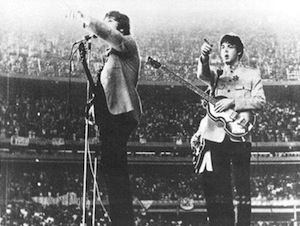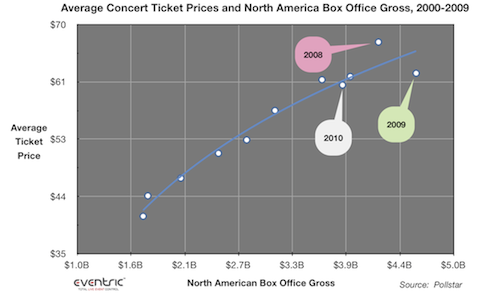 The recent release of the Beatles catalog on iTunes made me think - what did a ticket to see them at their live peak cost?
The recent release of the Beatles catalog on iTunes made me think - what did a ticket to see them at their live peak cost?
Answer: a prime seat to see the Beatles in Chicago 1966 cost $5.75 - in today’s dollars this is $37.60 - almost ten times less than what you would pay for a huge act today.
Things were different then of course - touring was done mainly to promote record sales and tickets were priced below market purposely to make sure shows were safely sold out and to reward fans for their record-buying loyalty. This produced what economists call a consumer surplus. Some of that surplus was soaked up by the secondary ticketing market.
Then things changed last decade as recorded music revenue declined, bands toured more, and ticket prices went up - dramatically. According to Pollstar, in 2000 the average ticket prices was $41. In 2008, it was $67 - a 40% increase in just 8 years.
 Normally when a price increases that much you’d think demand would go down. But the total revenue for the concert industry kept going up - exploding, really. A couple explainations: 1) tickets were underpriced 2) demand for concerts was relatively inelastic. (Economists call demand inelastic when people’s demand for things isn’t that sensitive to the price - like beer and cigarettes.)
Normally when a price increases that much you’d think demand would go down. But the total revenue for the concert industry kept going up - exploding, really. A couple explainations: 1) tickets were underpriced 2) demand for concerts was relatively inelastic. (Economists call demand inelastic when people’s demand for things isn’t that sensitive to the price - like beer and cigarettes.)
Plotting Pollstar data of the average ticket price vs. total box office gross from the years 2000 - 2010 revealed an interesting total revenue curve:

The data points create a nicely fitted trend line. On its own it says that the demand was there all the time and that the industry responded by providing the supply and upping the prices. Promoters were increasing ticket prices and people kept buying more - the opposite of what you would expect from price increases of this nature.
But the upward price trend can’t go on forever. Once you hit a certain price point you’ve soaked up the excess demand and now your good (concerts) is subject to more competitive alternatives for entertainment (i.e. movies, video games, booze).
The chart suggests that we’ve reached that price point. In 2008 (during a raging recession) average ticket prices jumped at its highest rate in the decade to $67. Gross box office revenue set a record of $4.2B. But that was actually a softer revenue figure than the trend line - if you follow the line, at that price revenue should have been closer to $5B. But it wasn’t - demand fell at that price.
In 2009 ticket prices declined (and for the first time) but the industry had its best year ever with $4.6B in box office revenue and a record numbers of tickets sold, even better than what the trend suggested would be the case.
In 2010 the industry experienced a well documented decline. But looking at the graph the year 2010 looks like it is falling into line with the past years. What I gather from this is that the concert industry as a whole cannot depend on continued price increases for tickets to grow the industry. Once we get past the $60 mark for average ticket prices, you will start to see more unpredictable results than the world when tickets were safely underpriced. We saw that this year with discounting after on-sale, excessive papering, and cancels - all things that have toxic effects for the industry as a whole.
 So increases in total revenue are going to come from more shows and tickets, not price increases. To increase profit in a slower growth industry, costs are going to need to come down, more efficiencies need to be wrung out. (I’ll talk about the cost side of the concert industry in another article - do we really suffer from Baumol’s Cost Disease?)
So increases in total revenue are going to come from more shows and tickets, not price increases. To increase profit in a slower growth industry, costs are going to need to come down, more efficiencies need to be wrung out. (I’ll talk about the cost side of the concert industry in another article - do we really suffer from Baumol’s Cost Disease?)
Getting back to the Beatles - you obviously cannot pay $37 in today’s dollars to go see the 1966 Beatles. However, you can go see the Beatles tribute act Rain (I hear it’s very good) for $129.
Brian Carpizo is the CEO of Eventric, a provider of software and online services for the professional live entertainment industry. He can be reached at brian (at) eventric.com.
No comments:
Post a Comment